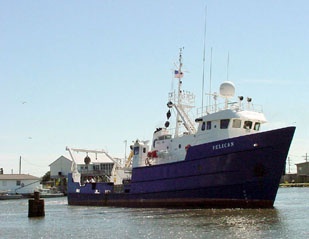BP funds Gulf research, but not the boats needed to conduct it

In the wake of its 2010 Gulf of Mexico oil disaster, BP pledged up to $500 million over a decade to create an independent program to conduct scientific research at institutions in the U.S. Gulf states. Known as the Gulf of Mexico Research Initiative, the program is studying various aspects of the spill, including the fate of the oil and its environmental effects.
Scientists say the program is critically important in order to understand the impact of the disaster and to ensure a more effective response to future oil releases.
But the initiative has a major shortcoming.
"They have provided money for research, but not for vessels," said Ian MacDonald, a professor of biological oceanography at Florida State University.
MacDonald spoke about that disconnect during his keynote address at the annual Gulf Gathering, which brought together community organizers from across the region in Fairhope, Ala. this week to discuss a united response to the BP disaster.
"Doing oceanographic work is really expensive because you need big ships to take scientists and equipment offshore," MacDonald told Facing South in an interview. "It's not unusual to need $50,000 a day to operate."
While there are smaller research vessels available that cost only around $10,000 a day, they don't have adequate lab space for major undertakings.
MacDonald noted that four institutions -- Texas A&M, the University of Mississippi, Florida State University and the University of South Florida -- have been awarded grants through the Gulf research initiative. But none of those grants included a mechanism to pay for ship time, he said.
Consequently, the scientists are hindered from collecting and processing samples -- and thus from understanding what's happening in the Gulf, where research vessels are especially scarce.
The University-National Oceanographic Laboratory System (UNOLS), headquartered at the University of Rhode Island's Graduate School of Oceanography, coordinates research vessel use for federally funded ocean science. UNOLS currently operates 22 research vessels, but only one is based at a homeport in the Gulf -- the Pelican, which operates out of the Louisiana Universities Marine Consortium in Cocodrie, La. And the Pelican (photo) is a smaller ship that isn't adequate for some types of research.
Meanwhile, MacDonald pointed out, the oil companies have advanced vessels at their disposal.
MacDonald said he hopes that some recovery money coming to the Gulf through the civil lawsuit against BP (which has been delayed for a week as the parties continue settlement talks) would be directed to science and research.
"We have to track the course of recovery as well as to document damage," he said in making the case for why science -- and the ships to conduct it -- need more resources. "We also have to understand how system works in order to protect it better in the future."
MacDonald offered one other suggestion for how to ensure Gulf science gets the funding it deserves: place a research tax on oil companies.
(Photo of the Pelican from the Louisiana Universities Marine Consortium website.)
Tags
Sue Sturgis
Sue is the former editorial director of Facing South and the Institute for Southern Studies.
